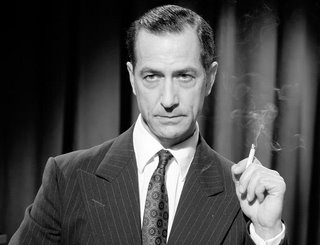Quality T.V. and the Guantanomisation of Justice
I'm just back from the cinema, where my wife, myself and about ten other people, watched George Clooney's new film, "Good Night and Good Luck". It's the historical-biography of campaigning investigative reporter Edward R. Murrow, and his battle against McCarthyism in 1950s America. It is all dialogue, little 'action', and shot entirely in black and white.
The cultural atmosphere of the times is nicely built up, with oddities such as cigarette advertising, and company marriage policies thrown in; to compliment the obvious visual setting. The fear, suspicion, and danger of the 'witch-hunt' era is well done, as journalists battle with the military, with advertisers, media owners and most of all their own consciences as to what issues to cover. Not content to hide in the safe waters of celebrity interviews and gossip, Murrow and his team decide to tackle McCarthy through documentary TV program making.

The strain on the characters is well played, as they anticipate the reaction from the McCarthyites, in response to their challenge. David Strathairn is excellent at Murrow (above), Clooney good as his writing partner, and Frank Langella as CBS boss William Paley is brilliant. Murrow's furrow-browed monologues to camera are compelling, and are made all the more dramatic as his 'on-air' studied concentration gives way to nervous glances around the studio on completion of the pieces.
The film makes two incisive contemporary points:
It is not co-incidence that a film about the McCarthy era has been made in 2006, in the USA. As Arthur Miller sought to expose McCarthy by historical precedent in 'the Crucible'; Clooney and Co, have used Miller's target narrative as their historical precedent. One of the critical points repeated in the film was Murrow's exposure of the failure of McCarthy to adhere to constitutional principles of justice, because of the perceived imminent threat of an outside malign influence. Murrow's consistent view was that circumventing 'habeas corpus type rights', abrogates our responsibility to maintain the moral high ground, thus strengthening the position of the 'enemy'. Furthermore, it demonstrates an inability of the perpetrator to win the battle of ideas, belying an insecurity - which all the protestations to the contrary do not remove. The fact that America is now holding hundreds of 'enemy combatants' without due process of law hardly needs to be stated.
The other major attack this film wages is against the idea that television and film can do no more than entertain, and ultimately numb and insulate the population (er, that's called dumbing-down today). The fact that the film starts and finishes with excerpts from Murrow's speech at an awards ceremony in which he rails against this, is significant. The writers clearly wanted to broaden the scope of the film's impact from the civil liberties issues, and into the realm of what television is for, and what standards of excellence it should persue.
Right, I'm off to watch "Today with Des and Mel".................

No comments:
Post a Comment